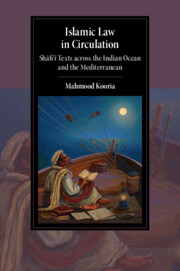Book contents
- Islamic Law in Circulation
- Cambridge Studies in Islamic Civilization
- Islamic Law in Circulation
- Copyright page
- Dedication
- Contents
- Figures
- Acknowledgements
- Notes on Transliteration, Dates and Places
- Chapter
- Introduction
- Chapter
- 1 Circulation Networks
- Chapter
- 2 Circulatory Texts
- Chapter
- 3 Architecture of Encounters
- Conclusion
- Bibliography
- Index
- Other Titles in the Series:
2 - Circulatory Texts
from Part I
Published online by Cambridge University Press: 24 March 2022
- Islamic Law in Circulation
- Cambridge Studies in Islamic Civilization
- Islamic Law in Circulation
- Copyright page
- Dedication
- Contents
- Figures
- Acknowledgements
- Notes on Transliteration, Dates and Places
- Chapter
- Introduction
- Chapter
- 1 Circulation Networks
- Chapter
- 2 Circulatory Texts
- Chapter
- 3 Architecture of Encounters
- Conclusion
- Bibliography
- Index
- Other Titles in the Series:
Summary
Texts played a central role in the transregional and transtemporal spread and survival of the Shāfiʿī school and Islamic law broadly. Jurists were primarily concerned to engage with texts, studying, teaching, interpreting, abridging, commenting, referencing and cross-referencing, contextualising, systematising and prioritising them. Texts constituted their spheres of influence, and through them they defended and established themselves as authorities on religious law. Properly formulated legal texts and pronouncements of fatwās or judgements on the basis of texts constituted the axis of the fuqahā estate. The whole community of jurists became active with discourses on works written by masters, their disciples, disciples’ disciples and so on. This “textuality” was there in the prototype of micro-networks and its later developments, but the intensification of macro-networks of fuqahā estates made texts more crucial, for they facilitated the circulation of juridical ideas across long distances and periods.
- Type
- Chapter
- Information
- Islamic Law in CirculationShafi'i Texts across the Indian Ocean and the Mediterranean, pp. 68 - 99Publisher: Cambridge University PressPrint publication year: 2022

